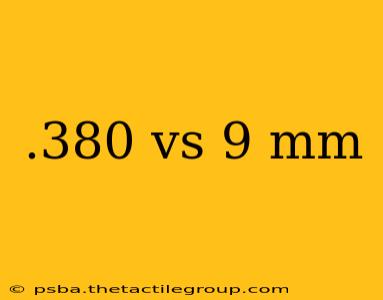Choosing the right caliber for self-defense or concealed carry is a crucial decision, demanding careful consideration of various factors. This in-depth comparison of the .380 ACP (Automatic Colt Pistol) and the 9mm Parabellum cartridges will help you understand the key differences and make an informed choice. We'll explore ballistics, recoil, capacity, availability, and cost to provide a comprehensive overview.
Ballistics: Power and Penetration
The most significant difference between the .380 ACP and 9mm lies in their ballistics. The 9mm round packs a considerably more powerful punch.
9mm Advantages:
- Greater Stopping Power: The 9mm's larger projectile and higher velocity translate to significantly more energy upon impact, increasing the likelihood of stopping a threat quickly.
- Increased Penetration: The 9mm generally penetrates deeper than the .380 ACP, offering better performance against potential barriers like clothing or car doors.
- Wider Range of Ammunition: The 9mm offers a broader selection of ammunition types, including defensive rounds designed for optimal expansion and stopping power.
.380 ACP Advantages (relatively speaking):
- Reduced Recoil: The smaller .380 ACP cartridge produces noticeably less recoil, making it more manageable for individuals with smaller hands or less shooting experience. This can lead to faster follow-up shots.
- Improved Concealability (in some cases): The smaller cartridge often allows for smaller, more easily concealed firearms. However, this is not always the case, as some 9mm pistols are also designed for excellent concealment.
Recoil and Shootability
As mentioned, recoil is a major factor influencing the choice between these calibers. The 9mm's higher recoil can be challenging for some shooters, potentially affecting accuracy and follow-up shot speed. The .380 ACP's softer recoil, however, makes it easier to control, particularly for beginners or those with limited upper body strength. This is a highly personal preference, and practical shooting experience is vital in determining which recoil profile suits you best.
Magazine Capacity
Generally, 9mm handguns offer higher magazine capacities than their .380 ACP counterparts. This means more rounds available in a self-defense situation. While advancements in .380 ACP pistol design are increasing capacities, the 9mm generally maintains a significant advantage in this area.
Ammunition Availability and Cost
Both .380 ACP and 9mm ammunition are widely available, but the 9mm enjoys greater accessibility and often lower cost per round. This is largely due to its more extensive use by law enforcement and military agencies worldwide.
Choosing the Right Caliber: Considerations for Self-Defense
The "best" caliber ultimately depends on individual needs and circumstances. Consider these factors:
- Shooting Experience: Beginners might find the .380 ACP more manageable due to its lower recoil.
- Physical Capabilities: Individuals with smaller hands or less upper body strength may prefer the .380 ACP.
- Concealment Needs: While the .380 ACP often lends itself to smaller firearms, advancements in 9mm designs have minimized this difference.
- Personal Preference: Ultimately, the best caliber is the one you can shoot accurately and confidently under pressure. Range time with both calibers is essential.
Conclusion: Informed Decision Making
The .380 ACP and 9mm represent viable self-defense options, each with its own strengths and weaknesses. The 9mm provides superior stopping power and penetration, while the .380 ACP offers reduced recoil and potentially better concealability in certain firearm platforms. Thorough research, professional guidance, and extensive hands-on experience are crucial before making a final decision. Remember to prioritize safe gun handling practices and responsible firearm ownership regardless of your chosen caliber.

